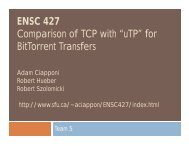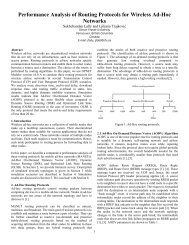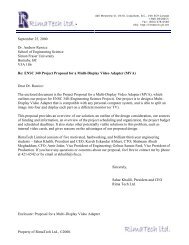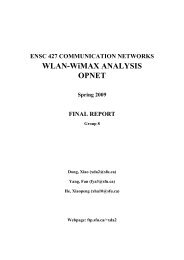Fleksibilni Internet servisi na bazi kontrole kašnjenja i
Fleksibilni Internet servisi na bazi kontrole kašnjenja i
Fleksibilni Internet servisi na bazi kontrole kašnjenja i
Create successful ePaper yourself
Turn your PDF publications into a flip-book with our unique Google optimized e-Paper software.
all incoming traffic. User is not allowed to exceed the peak rate specified by the SLA.<br />
Hence, premium service provided by EF is low-delay, low-jitter, and nearly constant bit<br />
rate service suitable for <strong>Internet</strong> telephony and video conferencing.<br />
The Assured Forwarding (AF) defines four forwarding classes with three drop<br />
priorities within each class. Each combi<strong>na</strong>tion of AF service class and drop priority is<br />
associated with distinct DSCP code. In every DiffServ node, certain amount of buffer<br />
space and bandwidth is allocated to each class. In case of congestion, the drop priority of<br />
a packet determines its relative importance within its class. In order to protect packets<br />
with lower drop priority from being discarded, a DiffServ router preferentially discards<br />
packets with higher drop priorities. Hence, in the case of network congestion, the assured<br />
traffic with lower priority may still experience packet losses and high delay as in a best-<br />
effort network.<br />
Even though DiffServ model elimi<strong>na</strong>tes certain drawbacks of IntServ, such as the<br />
scalability problem, it has not been widely accepted and deployed. Since DiffServ<br />
provides per-hop QoS differentiation on a class level, it is difficult to ensure end-to-end<br />
performance defined by a SLA contract. From a commercial viewpoint, this is a major<br />
disadvantage because it implies that it is impossible to charge the service defined by the<br />
SLA. Furthermore, DiffServ model cannot be deployed incrementally because all<br />
network nodes are required to support DiffServ mechanisms in order to provide specified<br />
QoS parameters. In 2001, <strong>Internet</strong>2 QoS Working Group discontinued deployment and<br />
testing of the premium service because of the lack of demand and support from major<br />
router vendors [11].<br />
13






